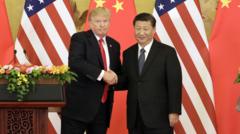With President Trump's tariffs going into effect, the landscape of international trade is shifting dramatically, causing stock market fluctuations and prompting retaliatory tariffs from affected nations.**
Trump Tariffs Trigger Global Trade Tensions as Allies and Rivals Respond**

Trump Tariffs Trigger Global Trade Tensions as Allies and Rivals Respond**
The imposition of steep tariffs by President Trump sets off retaliatory measures from allies and China, raising fears of an escalating trade war.**
President Trump has commenced a controversial trade initiative, enforcing tariffs that are impacting nearly all U.S. allies and imposing tax rates on Chinese goods that surpass 100 percent. As of this morning, Trump reported that 70 countries have already approached the U.S. regarding trade agreements, with discussions set to begin with Japan and South Korea.
In response, China has imposed its own tariffs, while the European Union is gearing up to introduce retaliatory measures against American products by next week. These escalating trade tensions have sparked widespread concerns about a potentially damaging trade war and our risk of global recession, as markets across the world exhibit significant volatility. Industry analysts, including David E. Sanger, argue that the Trump administration is dismantling the existing global trading system without a viable plan for its replacement.
The stock market experienced turmoil as the S&P 500 opened strong but ultimately fell by 1.6 percent, leading analysts to suggest that investors had miscalculated the administration's commitment to deeply aggressive tariffs. Meanwhile, Asian markets suffered declines earlier in the day.
In the automotive sector, the administration’s recent 25 percent tariffs on imported vehicles have caused disruptions, prompting some companies to halt shipments to the U.S. and lay off workers in American-based plants as operations in Canada and Mexico are affected.
As tensions escalate, even notable figures like Elon Musk have weighed in, criticizing Trump's chief trade advisor. Additionally, comments from Vice President JD Vance regarding China were deemed offensive by Chinese authorities.
Despite private reservations within the oil and gas sector regarding Trump’s tariff policies, these executives have so far refrained from publicly criticizing the administration. In response to these developments, Trump has also signed multiple executive orders aimed at bolstering coal production, evoking further debate on economic strategies going forward.
For ongoing updates on this complex situation and Trump’s leadership initiatives, stay tuned to our dedicated coverage.























